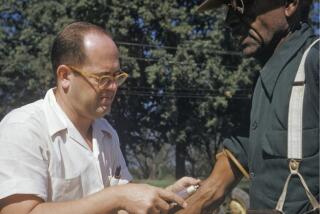Isolationist Sentiment in U.S. Tapering Off, Poll Says
WASHINGTON — A prolonged trend toward isolationist sentiments among Americans appears to have stabilized, according to opinion poll results released Thursday.
“Although isolationism remains a large minority sentiment, it appears to have stabilized in recent years,” concluded the survey conducted by the Pew Research Center for the People and the Press.
A view that the United States should leave messy international problems, such as the conflict in Bosnia-Herzegovina, to others and concentrate on its own pressing domestic agenda had grown steadily during the initial years of the post-Cold War era, from one-third of the population to more than 40% by mid-1995.
By last month, however, that figure had slipped below 40%.
The Pew study also found that the more than 500 U.S. opinion leaders surveyed saw the world as a better, safer place in which American influence has increased substantially over the last four years.
While the public agrees with the nation’s elite that President Clinton has done a good job in foreign affairs, it does not share the broader optimism of the group, the poll showed.
The poll found that only 29% of those surveyed among the public pronounced themselves “satisfied with the way things are going in the world,” but twice that number--58%--of the country’s elites said they were comfortable with the flow of events.
“It’s a gap that’s opened up,” said Andrew Kohut, director of the Pew center in Washington. “Maybe there’s a lag, but it seems now that the more you know, the better you feel.”
The extent of the shift in views among almost all elite groups targeted is dramatic. Among senior-level business and financial leaders, for example, only 33% said in a similar 1993 poll that they were satisfied with the way things were going in the world. This year, double that number reported themselves as satisfied. Among experts on security issues, the shift was even greater, from 15% to 61%, while for religious leaders the good feelings increased from 15% to 50%.
Kohut said polling data indicated that it was mainly the perception of Clinton’s performance that was behind the shift in views.
“It has to do with Bill Clinton,” Kohut said. “His approval ratings have rocketed.”
Among the survey’s findings:
* The nation’s opinion leaders believe that the danger of an attack on the United States with a weapon of mass destruction has diminished over the last decade, but those who arguably know the most about the subject--security experts--believe that it has substantially increased.
* A majority of the elite groups polled listed nationalism and ethnic hatred as the greatest threats to world stability.
* While all 10 groups of opinion leaders questioned for the survey believed that the nation’s top foreign-policy priority should be to stop the spread of nuclear weapons, the public considered proliferation second to protecting the jobs of American workers.
More to Read
Get the L.A. Times Politics newsletter
Deeply reported insights into legislation, politics and policy from Sacramento, Washington and beyond. In your inbox three times per week.
You may occasionally receive promotional content from the Los Angeles Times.










